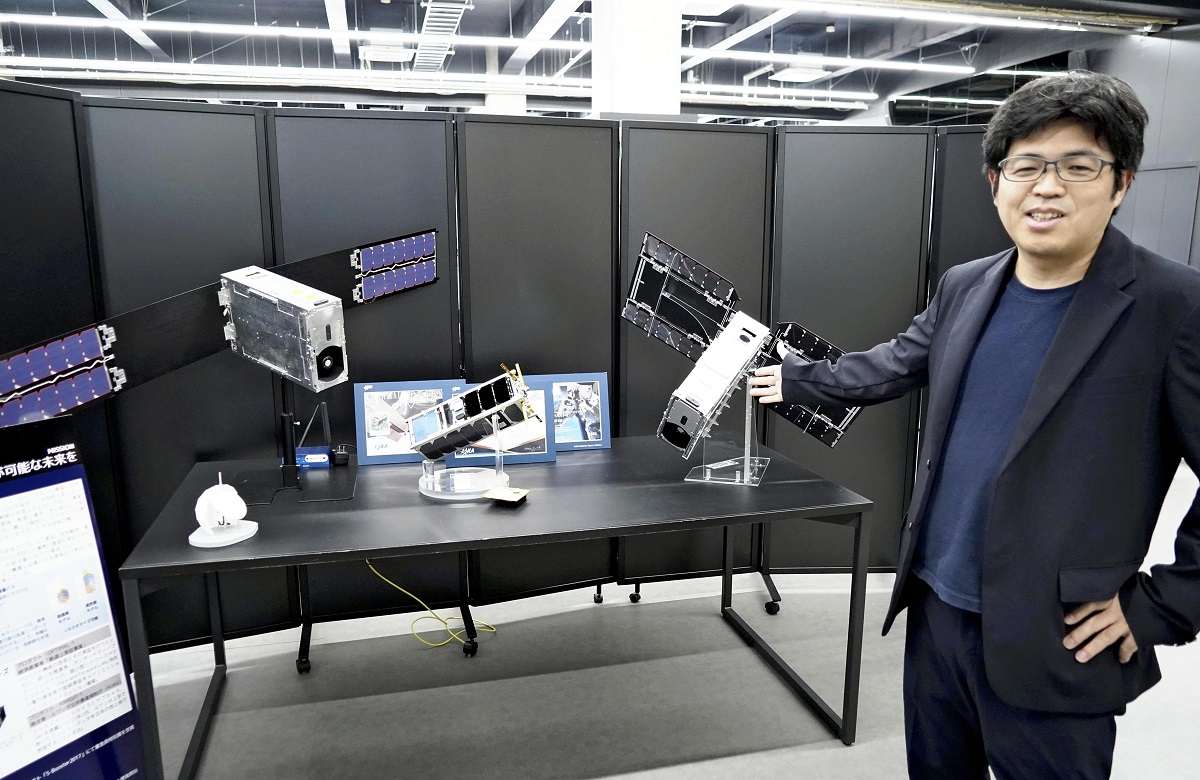
Takayoshi Fukuyo, CEO of ArkEdge Space Inc., explains capabilities of microsatellites in Koto Ward, Tokyo, in November.
13:23 JST, December 20, 2023
The government has churned out plan after plan for large-scale aid to space development by the private-sector. In its economic stimulus package approved by the Cabinet in November, the government included a ¥1 trillion fund for the field, and presented a policy backing related startups.
The moves were propelled by worry that Japan is falling behind in the rapidly evolving global space race.
10-years’ capital
Key to the government push for space development is a fund that will be set up within the Japan Aerospace Exploration Agency. The fund is intended to cover a 10-year period.
By the end of the fiscal year, the government will allocate ¥300 billion to the fund and realize its full size of ¥1 trillion sometime in or after fiscal 2024.
“These measures are a necessity for accelerating space development and not falling behind amid intensifying international competition,” said Sanae Takaichi, state minister for science and technology policy, at a press conference in November.
Space-based businesses take years to turn a profit and are high risk. Big companies are generally cautious about entering the field, and startups play an important role in innovating without fear of failure, making startup aid essential for the sector’s growth.
This has triggered a raft of measures from the government.
In 2021, the government revised a law meant to boost science, technology and innovation, and thereby gave JAXA more leeway to fund private companies.
The government also expanded a scheme to assist small and midsize companies so that JAXA can strategically provide concentrated aid to startups the agency wants to help grow.
In October it was decided that a joint venture comprising four key companies, including Tokyo-based ArkEdge Space Inc., would receive up to ¥3.5 billion in subsidies through the scheme.
ArkEdge Space is a startup with ¥100 million in capital that was established in 2018. The company plans to monitor illegal loggings from space using microsatellites weighing 100 kilograms or less.
“To win globally we need to be quick about it,” said Takayoshi Fukuyo, founder and chief executive officer of the company. “The government’s aid will be an important step toward commercializing our technology.”
Harsh reality
The space industry has grown very close to people’s lives, and space tech is used to meet a wide range of needs. Positioning and weather information provided through satellites are used for various purposes such as managing traffic and improving efficiency for agriculture, fisheries and forestry businesses. The industry is rapidly expanding its reach, with trips also having been made to space for tourism in recent years.
One major U.S. financial company has forecast the global market for the industry will reach about ¥150 trillion in 2040.
Japan’s space industry has depended on public sector demand, such as government orders for satellites, but it’s now facing a major shake-up.
In the Basic Plan on Space Policy, approved by the Cabinet in June, the government lists a goal of doubling the value of the domestic space market to ¥8 trillion in the 2030s. But the reality is stark.
According to a research by Spacetide Foundation, which promotes the space industry, investment in U.S. space startups last year came to $6.6 billion (about ¥860 billion based on the exchange rate at that time). This accounted for 73% of such investment worldwide. For Japanese startups, investment totaled $260 million (about ¥34.5 billion).
Japan does have promising startups, such as Tokyo-based ispace, inc., which wants to develop the moon, and Hokkaido-based Interstellar Technologies Inc., a firm established by entrepreneur Takafumi Horie that builds rockets. However, only a few startups list their shares.
Transparency
A vibrant space industry is a must for Japan. Failure to boost space development, needed for everything from satellite businesses to national security, will directly affect the nation’s strength in the future.
In China, where the government is promoting partnerships between the military and private sector, startups have sprung up one after another and are rapidly improving their tech capabilities.
By the end of this fiscal year, the government will compile a space technology strategy to indicate which tech is to be given priority in development.
Based on the strategy, the government and JAXA will provide aid using the ¥1 trillion fund starting in fiscal 2024.
“The government should strategically support highly competitive companies and create an environment that fosters private funding,” said Atsushi Uchida, a senior researcher at Mitsubishi Research Institute and an expert on space development.
JAXA does not have to spend the entire fund in one fiscal year, allowing it to spend more flexibly than with its regular budget. While this has its advantages, there is a chance public funds could sit unused if forecasts of demand are too optimistic.
Funding sources include government debt, sold via government bonds. If the fund is poorly managed, it could burden future generations.
The government must be transparent about how it is spending the money, such as by explaining why any particular expenditure is needed.
"Politics" POPULAR ARTICLE
-

Japan to Support Central Asian Logistics Route That Bypasses Russia, Plan to Be Part of Upcoming Summit in Tokyo
-

Japan to Tighten Screening of Foreigners’ Residential Status by Providing Information of Nonpayment of Taxes
-

Chinese, Russian Bombers Flew Unusual Path by Heading Toward Tokyo; Move Likely Meant to Intimidate Japan
-

Japan Plans National Database to Track Foreign Ownership of Real Estate, Land as It Weighs New Rules
-

Up to 199,000 Deaths Estimated From Mega-Tsunami; Most Recent Occurrence Took Place in 17th Century
JN ACCESS RANKING
-

Tokyo Economic Security Forum to Hold Inaugural Meeting Amid Tense Global Environment
-

Keidanren Chairman Yoshinobu Tsutsui Visits Kashiwazaki-Kariwa Nuclear Power Plant; Inspects New Emergency Safety System
-

Imports of Rare Earths from China Facing Delays, May Be Caused by Deterioration of Japan-China Relations
-

University of Tokyo Professor Discusses Japanese Economic Security in Interview Ahead of Forum
-

Japan Pulls out of Vietnam Nuclear Project, Complicating Hanoi’s Power Plans























